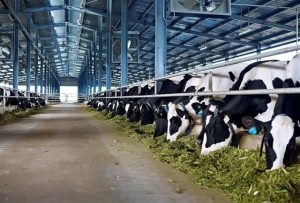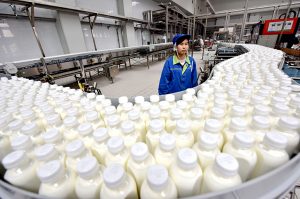
Uruguay’s exports to China surged to a record high last year, fueling hopes of further gains if efforts by the two countries to scope out a free-trade deal bear fruit.
Uruguay, a South American country with just 3.5 million people, sent shipments to China worth more than $3.2 billion. The trade partners are in exploratory discussions for a free-trade agreement, which many see as likely to provide further momentum to bilateral economic exchanges.
“China continues to be the leading export destination. Exports (to China) grew 53 percent in 2021 and reached $3.27 billion, representing 28 percent of (Uruguay’s) total exports,” Uruguay XXI, the country’s trade and investment promotion agency, said in a recent report.
“The increase is explained by higher sales of beef, which accounted for 45 percent of total exports to China,” the agency said. “Other products whose sales to China increased significantly were beef byproducts, timber, dairy products, live cattle and sheep and goat meat.”
The rapid increase in trade with China, particularly in products such as beef, is the result of a decadelong strategy to refocus Uruguay’s trade.
China has been Uruguay’s main trade partner since 2013 and beef exports have been growing steadily over the past few years. In 2021, these exports were supercharged, soaring 96 percent from the previous year. Beef exports to China alone came to almost $1.5 billion last year.
“There was a significant increase in exports from Uruguay because there was an increase in production,” said Alvaro Pereira, head of market access and intelligence at the National Meat Institute, a government agency.
“Climatic reasons slowed down some fattening and finishing processes in 2020, which meant that the following year there was more supply of raw material for the meat-processing industry. Additionally, COVID-19 implied temporary closures in some plants during 2020. Both effects explain why 2021 had a higher level of production and exports than the previous year.”
Pereira notes that exports to China saw “two years of year-on-year growth of more than 20 percent, even in a pandemic context”, and that “tariff conditions to which Uruguay is exposed make it unattractive to increase placements in other traditional markets”.
The country’s trade promotion agency said a confluence of factors helped boost Uruguay’s trade performance last year.
In particular, demand from China for beef and other agricultural products has been on the rise. This coincided with increased production by cattle ranchers, who see in China a key market with lower tariffs than those imposed by Western nations.
According to government data, China displaced the United States as the main buyer of Uruguayan beef. In 2005, the US was the main buyer, but today China buys 61 percent of the nation’s beef exports.
The increase in Chinese demand has been happening gradually due to an increase in the purchasing power of the Chinese people, said Maria M. Supervielle, a consultant on China-Latin America relations.
Feasibility study
Uruguay has been pushing for increased trade with China. In September last year, it was announced that a joint feasibility study would be undertaken on a bilateral free-trade agreement. This study is expected to be completed in 2022, and the next steps to be taken will be defined, according to Uruguay XXI.
Beyond beef and its derivatives, Uruguay also exports timber, soy, cellulose and dairy products to China.
“Timber had a significant impact on the increase in annual exports. Timber sales were $569 million in 2021, growing 64 percent compared to the value in 2020,” the government’s trade promotion agency said. “This increase is mainly due to higher volumes placed, although prices also increased in 2021.”
The Uruguayan government says the outlook for bilateral trade this year is favorable.

























